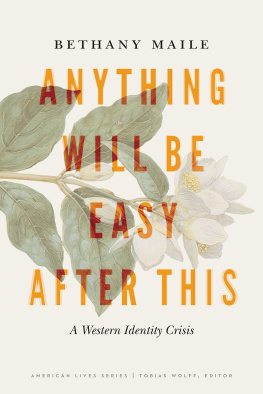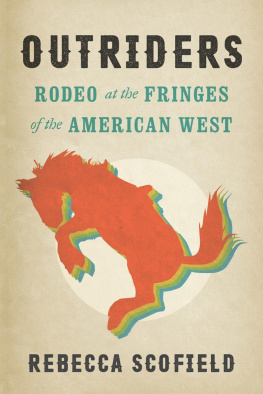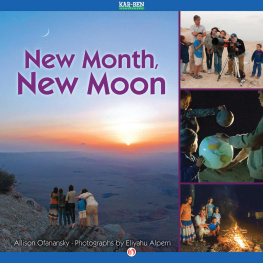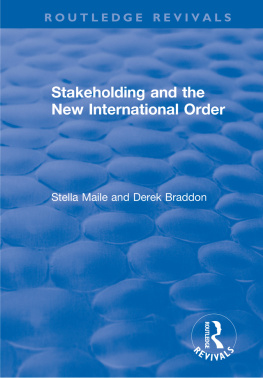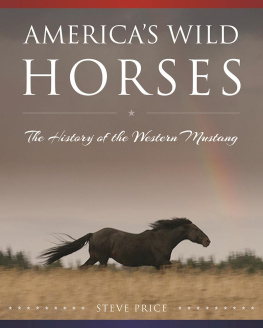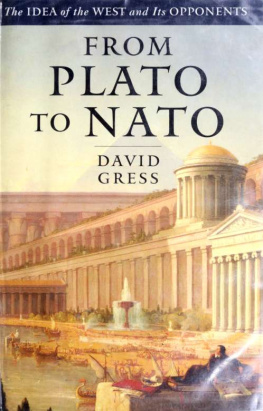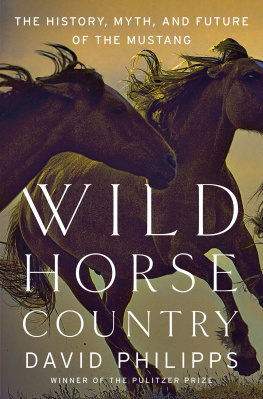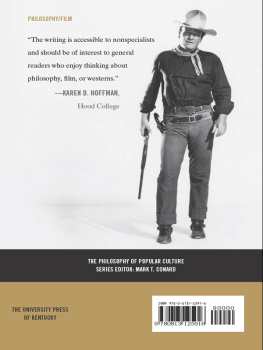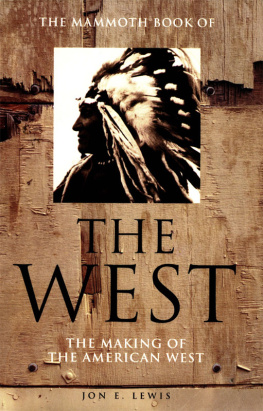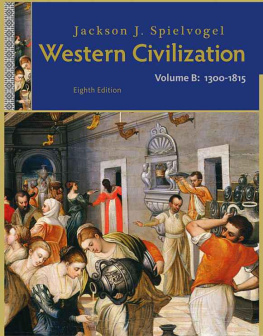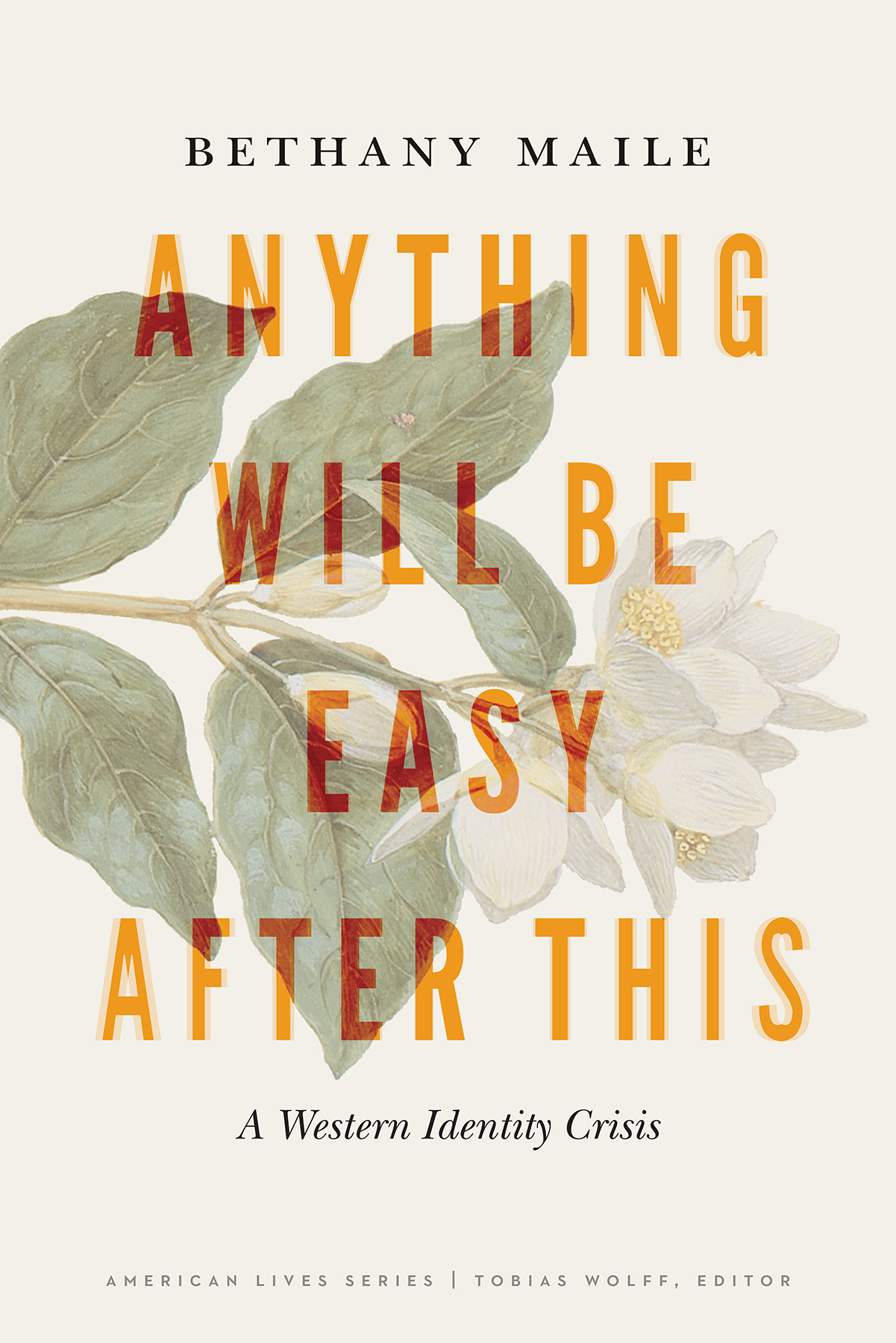
Anything Will Be Easy after This pairs old school journalistic immersion with formal ingenuity and weds Mailes healthy skepticism to her legit enthusiastic love for the Wests stories. Half excellent memoir and half blade-sharp cultural critique, this terrific book made me a convert to the complicated appeal of the state.
Ander Monson, author of Vanishing Point: Not a Memoir
Gorgeously written, vividly imagined, and poignantly observed, Mailes open-eyed essays are a heartbroken love song to Idaho: what it was, what it never was, what it is, what it might yet be. Whether she is contemplating motherhood or mustangs or Ray LaMontagne, rodeo queens or Dairy Queen, True Grit, or the gut-wrenching shame of genocide, Maile is a brilliant new voice in and of the West.
Kim Barnes, author of In the Wilderness: Coming of Age in Unknown Country
Bethany Maile writes with the emotional clarity of William Kittredge and the historical attention of Timothy Egan. In this wise, wide-ranging debut, Maile roots her inquiry in the old western concerns of authenticity, mythology, land, and family, yet her approach is fresh, fun, even postmodern.
Joe Wilkins, author of Fall Back Down When I Die
American Lives
Series Editor: Tobias Wolff
Anything Will Be Easy after This
A Western Identity Crisis
Bethany Maile
University of Nebraska Press | Lincoln
2020 by the Board of Regents of the University of Nebraska. Acknowledgments for the use of copyrighted material appear in , which constitutes an extension of the copyright page.
Cover designed by University of Nebraska Press.
Author photo Daniela Maile.
All rights reserved.
Library of Congress Cataloging-in-Publication Data
Names: Maile, Bethany, author.
Title: Anything Will Be Easy after This: A Western Identity Crisis / Bethany Maile.
Description: Lincoln: University of Nebraska Press, [2020] | Series: American Lives
Identifiers: LCCN 2019041518
ISBN 9781496220219 (paperback)
ISBN 9781496222428 (epub)
ISBN 9781496222435 (mobi)
ISBN 9781496222442 (pdf)
Subjects: LCSH : Maile, Bethany. | West (U.S.)Description and travel. | West (U.S.)Social life and customs. | IdahoBiography.
Classification: LCC F 595.3 . M 35 2020 | DDC 978dc23
LC record available at https://lccn.loc.gov/2019041518
The publisher does not have any control over and does not assume any responsibility for author or third-party websites or their content.
For my parents and Ren
We tell ourselves stories in order to live.
Joan Didion
If we do not evolve, we die.
William Kittredge
Contents
This book would not have happened without the support, guidance, and example of a few exceptional writers. Id like to first thank Ander Monson, whose belief in the early drafts of this project never stopped propelling it forward. I would also like to thank him for teaching me to be playful on the page and for telling me to write like a motherfucker. He said it before it was on a mug, I swear. I am indebted to Aurelie Sheehan, Alison Hawthorne Deming, and Fenton Johnson for their keen insights into the early pages of this book. Without Joy Passanante, Mary Clearman Blew, and Brandon Schrand, I would not have found my way to nonfiction, and I would not have understood the West as an idea that deserves (if not demands) exploration and interrogation. Thank you, Joe Wilkins, Alicia Christensen, and Abigail Stryker for carrying this book into the world.
I have benefited from a dear cohort of friends, readers, and general badasses. Craig Reinbold, Annie Lampman, Margaret Kimball, and Katherine Standefer, for reading the drafts, answering the emails, taking the calls, and being wonderful humans. I owe them many beers.
My friends and family have been my most steadfast believers. Becky MacDonald listened and encouraged and gave me room to write about her life. Tucker Mailes early and fervent support was unmatched. They were my first fans, and I am lucky to have them both. Margo and Jim Hunter, for giving me a room of my own, I am so appreciative. Stacy Haynes, Hallie Vinson, Lewis Drey, Chelsea Klikunas, Ella MacDonald, Daniela Maile, and the other folks who spent time loving my kids so I could wrap up this work, they are godsends, all.
To Ryan I owe more than I can say, so I will leave it at this: what luck, to have him in my corner. And to our daughters, who are the best possible motivation and inspiration, I am grateful for and to them every day.
Finally, I reserve my deepest gratitude for my parents, Tom and Colleen. Thank you for always reminding me that the answer is to just keep going and for helping mein all of the waysto do just that. Thank you for keeping books in my lap and a pen in my hand. Thank you for imagining that home on a hill, that pasture of mares bowed and grazing. Thank you for giving me stories to tell.
I wish to thank the following publications for their support of my work:
- Ladies Night at the Shooting Range, Prairie Schooner (2011)
- The Wild Ones, River Teeth (2011)
- True Grit, Country Strong, and Other Lies: A Taxonomy of Western Women, Normal School (2012)
- Anything Will Be Easy after This, Normal School (2013)
- The Slaughterhouse, High Desert Journal (2017)
- How Lady Antebellum Wrecked Country Music (in Nine Movements), Terminus Magazine (2018)
The commands were familiar: Tray tables, seat belts, emergency exits, oxygen masks; save yourself first. I didnt pay attention. It was 5:30 a.m., and I had a long day ahead: Boston to Chicago, Chicago to Salt Lake, a four-hour layover, and then, finally, Salt Lake to Boise, Idaho. It would be dark. The Treasure Valley would be a constellation of city lights, all of Ada County the Little Dipper. Outside the window Boston was a crosshatching of harbor lights, streetlights, headlights, flashing billboards, a skyscraper lit to read GO SOX . The Big Dipper, Hydra, the Milky Way.
The plane leveled out, takeoff over. Tray tables lowered; seats reclined. I pulled out a copy of Ginsbergs collected works. Hes the shit, a boy in my literature class had told me. Keep it. Howl was the only thing I recognized.
In dreams you walk dripping from a sea-journey on the highway
Across America in tears to the door of my cottage in the Western night.
A western cottage. My parents home: their wrap-around porch and horse pasture; the alfalfa fields that fringed Eagle, Idaho; the broad face of the Boise Mountains; the blue basins of the Owyhees. A dream. I envisioned that wide prairie sky, nothing like the slivers between Back Bay skyscrapers. I pictured my mare bucking at low thunder. I saw Clint Eastwood pull a six-gun; I heard Loretta Lynns trembled, jingling voice. I smelled spring thaw and wet hay. I barreled toward the Wild Westan illusion, a mython a journey with no destination.
Eagle, Idaho, is a farm townturnedglitzy suburb six miles northwest of the capital city. It is home to the Worlds Largest Rocky Mountain Oyster [testicle] Feed, a scatter of farm fields, three bakeries (one irksomely self-described as a cupcakery), two golf courses, a town gazebo, a Hilton, and one spa where tiny, forceful women massage rose petals into guests backs. It is home to a few ranchers and farmers and twenty thousand suburbanites.
Like so many eighteen-year-olds from barely known corners of the country, I was itching to leave, to swap the gravel roads for subway tracks, the hayfield keggers for neon-lit bars, the tract homes for brownstones. After high school I backpacked Europe (which was typical, just another kid scrimping money for train tickets and museum fees) and then enrolled at Emerson College in Boston. Air damp and salty, museums you could get lost in, a fine arts college full of young people who developed Kodak film and pinned French New Wave posters to their wallsall the things Id felt lacking in Idaho. I went east expecting prep school kids and crew on the Charles River.
Next page
